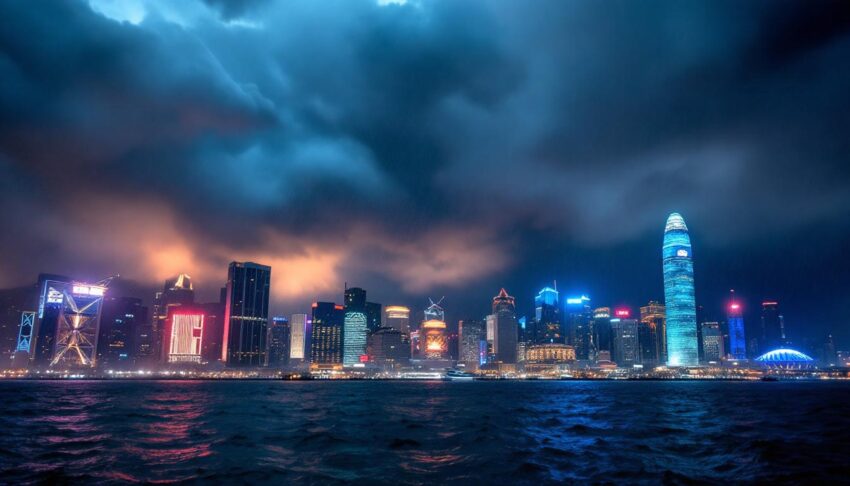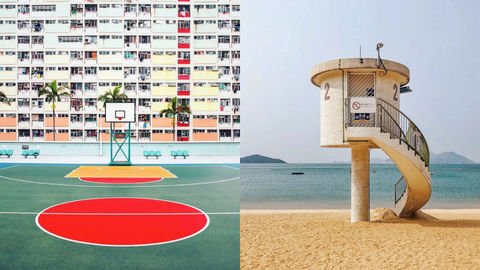Sunday, July 20, 2025

Typhoon Wipha In July 20, 2025, Typhoon Wipha approached Hong Kong and Macau, triggering severe traveling and tourism disruption, as well as normal life. Packing winds of more than 167 kph (103 mph) and dumping an intense amount of rain, the storm paralyzed the region’s transportation networks, flooded roads and led to the cancellation of thousands of flights, stranding tourists. 500 The number of flights that Hong Kong’s main airport, one of the busiest international hubs in Asia, canceled on Tuesday as it grappled with severe delays. Besides grounding air traffic, public transportation in Hong Kong and Macau, where the storm was headed next, were temporarily suspended as the storm passed through the region.
Both are international travel hubs and popular spots for tourists, so the two tourism and hotel hotspots are accustomed to typhoons. But what is certain is that the force of Typhoon Wipha has disrupted more than just the lives of the people living there, but also the itinerary of tourists who had hopes of visiting the islands. Whether you’re a traveler form Hong Kong or Macau, or are considering travel to the region, it’s important to know what’s going on, how you can work around travel disruptions, and what you can do to ensure safety.
Typhoon Wipha: A Powerful Storm Threatens Travel Plans
Typhoon Wipha: A Powerful Storm Threatens Travel Plans
Typhoon Wipha, a Category 2 storm, intensified quickly as it approached Hong Kong, bringing with it heavy rains and violent winds. As the storm passed over Hong Kong on Sunday, meteorologists recorded wind gusts reaching speeds of over 167 kph, making it one of the stronger typhoons to hit the region in recent years. The combination of strong winds, high sea swells, and torrential rain led to severe flooding in many areas of Hong Kong, particularly in the northern regions, close to the border with mainland China.
The Hong Kong Observatory issued a Typhoon Signal 10, the highest alert level, just before noon. The city then lowered the warning to Signal 8 in the afternoon, though the storm continued to wreak havoc throughout the day. In total, Hong Kong experienced more than 110 mm of rain within just three hours. Public officials reported over 470 trees downed by the forceful winds, and numerous streets were flooded, blocking access to popular tourist districts and landmarks.
Meanwhile, in Macau, a region famous for its massive casino industry and tourism, Typhoon Wipha’s effects were just as severe. The typhoon disrupted the Macau casino resorts, with flooding in the inner harbor area raising concerns about business continuity. This is especially concerning given Macau’s dependency on tourism and gambling, with visitors flocking to the region for entertainment and luxury stays.
Flight Cancellations and Transport Disruptions: Travel Woes for Tourists
For tourists, one of the most immediate effects of Typhoon Wipha was the disruption of air travel. Hong Kong International Airport, which handles tens of millions of passengers annually, was forced to cancel 400 flights. This move caused widespread delays and confusion for travelers. Approximately 80,000 people were affected by these flight cancellations, with travelers unable to depart or arrive as scheduled. The chaotic scene at the airport further complicated matters, as travelers scrambled to rebook flights and make alternate arrangements.
Cathay Pacific Airways, Hong Kong’s flagship carrier, canceled all flights between 5:00 AM and 6:00 PM on Sunday, leaving thousands of passengers stranded. While the airline took steps to mitigate the disruption by waiving rebooking fees and assisting with rebooking, the long wait times and uncertainty surrounding flight schedules left many frustrated. Other airlines also faced delays, though the scale of cancellations was particularly extensive at Hong Kong’s airport.
In addition to flight cancellations, the storm led to the suspension of many public transportation services. Most of the ferry services across Hong Kong’s iconic harbor were halted due to high waves and unsafe conditions. Even the city’s MTR (Mass Transit Railway) system faced interruptions, making it difficult for travelers to get around the city. Major streets in the city were flooded, and transportation routes to key tourist attractions like Victoria Peak and the bustling shopping districts in Central were inaccessible.
In Macau, public transport also faced significant disruptions. The ferries linking the city’s various islands were halted due to the storm’s high winds and swells. Visitors who had planned to take day trips to the nearby islands or visit the Macau Tower were advised to stay indoors until conditions improved. Many tourists who had arrived on short stays were forced to rearrange their plans, as the storm’s unpredictable trajectory kept affecting the timing of transport services.
The Complete Guide for Tourists Dealing with Flight Disruptions, Flooding, and Safety Concerns Amid the Storm
For tourists caught in the midst of Typhoon Wipha’s fury in Hong Kong and Macau, navigating the storm’s disruptions is essential to ensuring safety and minimizing inconvenience. Below are key tips and steps to manage flight cancellations, flooding, and safety concerns.
Flight Disruptions: What To Do If Your Flight Is Cancelled
With hundreds of flights grounded and delays expected, it’s crucial to stay informed about your flight status. Here’s what you should do:
- Check Airline Updates: Visit the airline’s website or mobile app to check for real-time updates. Many airlines, including Cathay Pacific, offer rebooking options or alternative flight arrangements. Keep your booking number handy for easy reference.
- Contact Your Airline: In case of cancellation, reach out to your airline’s customer service to discuss your options. Airlines are typically flexible with cancellations during extreme weather, offering fee waivers for changes or rescheduling flights.
- Prepare for Long Waits: The airport may be crowded and chaotic due to the storm’s impact. Bring necessary items such as snacks, water, and entertainment, and be prepared for long waiting times.
- Stay Flexible with Travel Plans: Since the storm’s course may change, stay flexible with your travel plans. Monitor flight updates closely and be ready to adjust accordingly.
Flooding and Safety Concerns: Staying Safe During the Storm
Flooding in Hong Kong and Macau presents a significant danger for tourists. To stay safe, follow these precautions:
- Avoid Flood-Prone Areas: Stay away from areas near rivers, coastlines, or low-lying neighborhoods, which are more susceptible to flooding. In Hong Kong, avoid visiting Tsim Sha Tsui Promenade or coastal parks, and in Macau, the inner harbor area.
- Seek Shelter: If you’re caught outdoors during heavy rain or flooding, seek immediate shelter in a nearby building or hotel. Many accommodations in Hong Kong and Macau are equipped to handle severe weather and will provide guidance on how to stay safe during the storm.
- Stay Inside: If the typhoon has reached your area, it’s safest to stay inside until authorities confirm that it’s safe to go outside. Keep windows and doors closed to protect against flying debris and strong winds.
- Emergency Contact Information: Have emergency contact numbers saved on your phone, including local emergency services and the embassy. Most hotels provide guests with a list of emergency contacts upon check-in.
- Follow Local Authorities’ Instructions: Listen to government warnings and safety instructions. Both Hong Kong and Macau have efficient public safety systems, and adhering to their advice will help ensure your safety.
Plan for Delays and Inconvenience
With flight disruptions and transport suspensions, travelers should be prepared for delays:
- Expect Delays in Public Transport: In addition to flights, many public transport services like ferries, buses, and the MTR system will be disrupted. Check local news sources and transport service websites for updates.
- Consider Travel Insurance: If you have travel insurance, ensure you understand the coverage related to cancellations due to extreme weather. Many policies cover unexpected disruptions and reimburse expenses incurred due to delays.
- Flexible Accommodation: If necessary, adjust your hotel booking to extend your stay until the weather improves. Hotels in Hong Kong and Macau are well-equipped to accommodate tourists during weather disruptions.
By taking proactive steps and being well-prepared, you can minimize the impact of Typhoon Wipha on your travel plans. While it’s impossible to predict every outcome, following these guidelines will ensure that you’re well-equipped to handle flight disruptions, flooding, and safety concerns.
Long-Term Impact on Hong Kong and Macau Tourism
While Typhoon Wipha has brought significant disruption to Hong Kong and Macau, the long-term impact on tourism is expected to be manageable. Both cities are accustomed to dealing with severe weather events, and recovery efforts will likely begin soon after the storm passes. Flights will be rescheduled, public transportation will resume, and floodwaters will gradually subside, allowing normal operations to return to both cities.
In the long term, tourism in Hong Kong and Macau will bounce back as it typically does after such events. The two destinations boast a resilient tourism infrastructure and are well-prepared to handle the aftermath of natural disasters. However, travelers planning visits to these cities should always consider typhoon season when booking trips, especially between May and November when storms are most frequent. Travel insurance can also help mitigate any potential losses due to cancellations or delays.
Conclusion: Typhoon Wipha’s Temporary Disruptions and What Tourists Can Expect
While Typhoon Wipha has temporarily disrupted tourism in Hong Kong and Macau, these iconic destinations will undoubtedly recover quickly. The immediate effects on flights, transportation, and public safety have caused major inconvenience for travelers, but the swift actions of local authorities and businesses are expected to restore order soon. For future travelers, it’s essential to plan ahead, stay informed, and remain flexible in the event of unexpected weather disruptions. Hong Kong and Macau will continue to offer world-class experiences for those seeking adventure, luxury, and cultural exploration.
Despite the challenges posed by Typhoon Wipha, the region’s robust tourism infrastructure and commitment to recovery mean that these destinations will remain top choices for international visitors.









